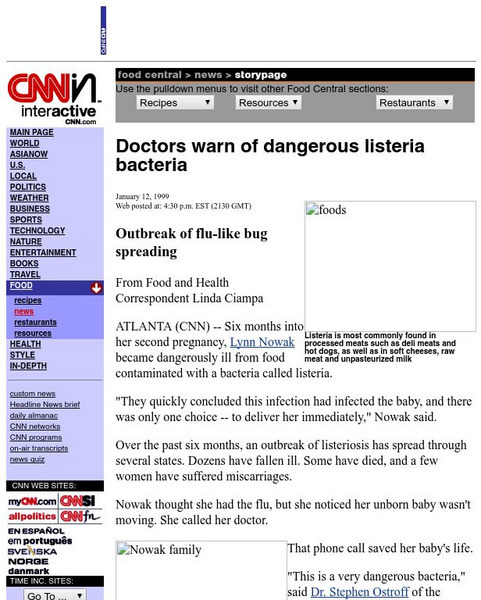ClassFlow
Class Flow: Microorganisms
[Free Registration/Login Required] In this unit children learn that there are many very small organisms called microorganisms which feed, grow and reproduce and which may be harmful or beneficial.
PBS
Nova: The Lives of Extremophiles
An interview with a microbiologist who studies bacteria that decompose hydrogen sulfide gas and other noxious chemicals. The interview focuses on her research and her career.
Centers for Disease Control and Prevention
Centers for Disease Control: Get Smart: Know When Antibiotics Work
This particular site discusses the surge in drug-resistant bacteria, and what you can do to prevent one from using you as a petri dish.
Merriam-Webster
Merriam Webster: Dictionary Illustration: Bacteriophage
Labeled illustration of a bacteriophage.
BBC
Bbc Schools: Livings Things: Microorganism Quiz
Take this quiz to assess your knowledge of microorganisms. Use the links to enlarge the quiz to full screen, take the quiz in a different format, read about microorganisms prior to taking the quiz, and try the fun, interactive learning...
University of Missouri
Umsl: Microbes in Action: Cultivation of Bacteria From Yogurt [Pdf]
Observe the two species of bacteria that are found in yogurt by cultivating them on agar plates. In this lab, students will use microbiology techniques to explore these anaerobes. Lesson plan gives a lab procedure, teacher instructions,...
Other
State of New Jersey Dept. Of Health: Shigellosis [Pdf]
Everything you need to know about shigellosis from causes to treatment and prevention. Very informative.
BiologyWise
Biology Wise: Aerobic Bacteria
Types of aerobic bacteria and examples of each are described.
BiologyWise
Biology Wise: Aerobic vs. Anaerobic Bacteria
Explains what aerobic and anaerobic bacteria are and what their differences are.
BiologyWise
Biology Wise: Bacteria That Are Commonly Present All Around Us
Examples of helpful and harmful bacteria are described in this resource.
BiologyWise
Biology Wise: Bacteria vs. Virus
Discusses what bacteria and viruses are and the differences between them.
BiologyWise
Biology Wise: Gram Positive Bacteria
Describes the characteristics of different types of gram-positive bacteria.
BiologyWise
Biology Wise: Bacteria That Are Helpful to Humans and the Environment
Describes the ways that bacteria benefit humans, the environment, and other things, such as through the process of fermentation and the treatment of sewage.
BiologyWise
Biology Wise: What Are Nitrogen Fixing Bacteria
Describes symbiotic relationship between leguminous plants and nitrogen-fixing bacteria. Explains the mechanism the bacteria use to fix nitrogen, the chemical formula involved, and different types of nitrogen-fixing bacteria.
BiologyWise
Biology Wise: How Do Bacteria Reproduce
Bacteria mainly reproduce asexually but some also use sexual reproduction. Two forms of asexual reproduction in bacteria are described - binary fission and budding, as well as sexual reproduction.
BiologyWise
Biology Wise: Facts About Spirillum
Describes the characteristics of the bacteria Spirillum, its shape and size, habitat, growth, method of storing nutrients, and facts about different species.
BiologyWise
Biology Wise: Unicellular Organisms
A unicellular organism is made of only a single cell. Its characteristics are described and several examples are provided.
BiologyWise
Biology Wise: Gram Negative vs. Gram Positive Bacteria
Explains the characteristics of gram-negative and gram-positive bacteria and provides a table comparing them based on different criteria.
BiologyWise
Biology Wise: Lytic Cycle
Explains what the lytic cycle of a virus is and the steps involved in the process.
BiologyWise
Biology Wise: Three Domains of Life
Describes the characteristics of Archaea, Bacteria, and Eukarya, the three domains of life.
Science4Fun
Science4 Fun: Bacteria
What are bacteria? Learn about the parts of a bacteria cell, bacteria and human health, and other fun facts.
Ducksters
Ducksters: Biography for Kids: Scientist: Louis Pasteur
Kids learn about Louis Pasteur's biography. He was a scientist who studied microorganisms like bacteria. He discovered pasteurization, vaccines, and proved that germs cause disease.
CNN
Cnn: Dangerous Listeria Bacteria
News story including general information about a listeria outbreak, listeria among pregnant women, warnings from doctors, informational numbers to call and info on safe food handling to prevent listeria contamination.
Science Fun for Everyone
Science Fun: Moldy Apples
Bacteria loves to grow on things like fruit. When you put fruit in the refrigerator, the cold temperature slows down the process. However, in this experiment apples are exposed to room temperature and soaked in different liquids. Observe...







![Umsl: Microbes in Action: Cultivation of Bacteria From Yogurt [Pdf] Activity Umsl: Microbes in Action: Cultivation of Bacteria From Yogurt [Pdf] Activity](https://d15y2dacu3jp90.cloudfront.net/images/attachment_defaults/resource/large/FPO-knovation.png)

